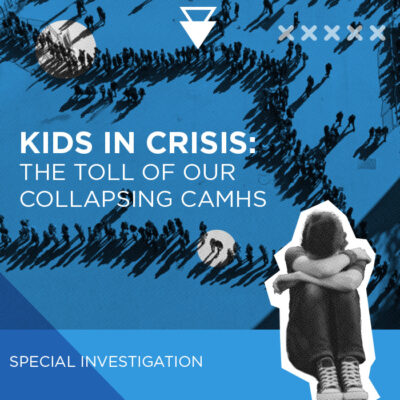Vulnerable children are being “dreadfully failed” on mental health support as a lack of funding and expert help pits schools and families against one another.
One parent had a stroke she believes was brought on by stress battling for extra support for their children. Others have been reported to the authorities for “fabricating” mental illness.
Huge waiting lists for external support, a lack of highly qualified experts inside schools, external pressures around attendance targets and exam results, and lack of funds to buy in help have contributed to mainstream schools failing to support some families.
Sofie’s son was signed off primary school by a GP last year after he was having “meltdowns” and said “he would rather be dead”.
But in an email from the son’s school three days later, the Lincolnshire mother was advised: “As a parent it is down to you to ensure he does come in on a daily basis.”
The school made my daughter do her top button up, and she felt she was choking
The email includes graphs of the boy’s attendance data and adds that “if on occasions [pupil name] is shouting and crying or refusing to dress, he can still be brought to school even in his pyjamas”.
The parent replied she “will categorically not be physically dragging my child to school, as this will only add to his anxiety”. She is now removing her child from the school.
The school, which we are not naming, did not want to comment.
Attendance support should be ‘first port of call’
Darren Northcott, national official for education at teachers’ union NASUWT, said the “first port of call” for improving attendance should be supportive measures to help the family.
Sarah Wild, headteacher of Limpsfield Grange School, a special school for girls with autism in Surrey, said “mainstream schools don’t always understand that everything is about relationships”.
“To get children back through the doors at school, that’s a really slow and gradual process of building the relationship,” she added.
The Department for Education is consulting on more prescriptive measures around school absence, which has risen sharply during Covid.
Evidence shows poorer pupils are more likely to be off school and fall behind.
A mother with a 16-year-old daughter in Surrey said her daughter has been “dreadfully failed” by the system.
The girl had been predicted top grades on leaving primary school but is now “barely in education” after insufficient help with suicidal feelings (see page 6 for full story).
Parents accused of ‘fabricating illness’
Another issue reported by parents is frequently not feeling believed by schools. Two mothers claim they were accused by schools of causing a “fabricated or induced illness” in their child, despite the pupil later getting a diagnosis.
The NHS say this is a “rare form of child abuse”.
One mother had to wait a year until her nine-year-old son was assessed by a Child and Adolescent Mental Health Service (CAMHS) in 2020. During this time she says her son’s behaviour became “really worrying” and he wrote down that he wished to die.
However at a multi-agency meeting, school staff reported her son was “fine in school” and they were concerned about parental fabrication of illness, she says.
The child was diagnosed with autism by CAMHS in May 2020.
“There was no apology for questioning for me, from the professionals in school who just tried to shut me down,” says the mother.
Schools Week could not contact the school because the parent was not happy to provide consent.
Another parent also claims her school’s headteacher reported her to CAMHS for a fabricated induced illness after she put in a complaint against a classroom teacher.
But she said: “It was so lucky CAMHS took my daughter’s suicidal ideation seriously.” Schools Week contacted the school but received no response.
Children’s needs ‘pushed to one side’
Parents also report schools being unwilling to change school rules to accommodate neurodevelopmental differences.
Emily, a mother in the Midlands, says her daughter’s secondary school would not accept a standalone educational psychologist report after the local authority rejected her request for an Education Health and Care Plan (EHCP) assessment.
As a result “the school made my daughter do her top button up, and she felt she was choking.”
After the girl seriously self-harmed in year 7 and was taken to A&E, “the school accepted she could undo her button”.
The local authority then conceded ahead of a tribunal and her daughter was diagnosed as autistic in year 8 and given a special school placement. Schools Week contacted the school and received no response.
A survey of 1,000 parents with a child on SEN support, published last year by Special Needs Jungle, warned “some parents believe, with good reason, that their children’s needs and education have been pushed to one side for the convenience of the majority”.
Battles are having severe impacts on some families. Tasha, a mum in Warwickshire, says she had a stroke brought on by stress in 2020 after “battling” for therapeutic support for her autistic son for eight years.
She says a psychiatrist who assessed her before she had a stroke had warned her social worker she had “carer’s burnout”.
The levelling up white paper promised £30 million over three years for councils to fund 10,000 more respite placements for disabled children to “give family carers a break”.
Samaritans are available 365 days a year. You can reach them on free call number 116 123, email them at jo@samaritans.org or visit www.samaritans.org to find your nearest branch

















As a learning mentor in a primary school and also a mother of a 15 year old school refuser of 3 months I can see the issues surrounding mental health from both sides.
There is definitely a lack of support in schools, not through understanding but through lack of resources. Since the pandemic, children as young as 4/5 are struggling with dealing with big feelings and anxiety. There are pathways of referral but all come with a waiting list of months! Mental health in our school is a top priority, with our SENDCO now trying to support children/ young people with more EHCP’s than ever before.
My son, has become a school refuser due to many factors/traumas in the last 2 years. The support from the school has been brilliant when he’s there but we have been constantly hounded when he isn’t. The EWO emails late in the evening asking for meetings at ridiculous times in the morning!
My son threatened to commit suicide. I emailed the school this information to have a reply as follows…’ Yes, he wasn’t in school yesterday either, was he Sarah! ‘
My own mental health is suffering immeasurably and I’ve been made to feel like a ‘bad parent.’ I have 5 children, a paramedic, a teacher, a media productions manager, a university student studying finance and accounting and my youngest. I’m definitely not a bad mother!
Every school should have a full time SENDCO and access to services without there being a waiting list of months and months. All school staff should be trained in mental health and all children should have workshops in school to give them the understanding of what mental health is and what they can do/who they can go to if they feel there mental health is deteriorating. Mental health understanding and support should start in primary school not secondary. Young people who present with compromised mental health issues in secondary school are harder to support than primary school.
More money should be put into the most important services.
As in all crisis situations more teaching, understanding and available services need to happen. Proactive not reactive!